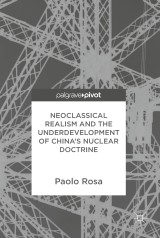Details

Neoclassical Realism and the Underdevelopment of China's Nuclear Doctrine
|
58,84 € |
|
| Verlag: | Palgrave Pivot |
| Format: | |
| Veröffentl.: | 06.04.2018 |
| ISBN/EAN: | 9783319786407 |
| Sprache: | englisch |
Dieses eBook enthält ein Wasserzeichen.
Beschreibungen
<p>This book addresses the under-researched discourse of the evolution of Chinese nuclear posture, and in particular, explains the absence from this evolution of a coherent and well-defined operational doctrine. Using a neoclassical realist framework, the book explains why China, after having launched a crash programme in the mid-1950s to develop a nuclear deterrent, did not debate a clear operational doctrine with respect to targeting and employment until the mid-1980s.</p>
<div>1. Introduction: Competing explanations for the underdevelopment of China’s nuclear doctrine </div><div>1.1. The underdevelopment of China’s nuclear doctrine – 1.2. “Existential deterrence” and minimum means of reprisal – 1.3. Traditional strategic culture and the art of ambiguity – 1.4. Maoist military thought and the downplaying of military technology – 1.5. Organization of the book</div><div><br></div><div>2. A neoclassical realist approach to military doctrines </div><div>2.1. Military doctrine and nuclear doctrine – 2.2. International source of military doctrine: The “balance of power” model – 2.3. Domestic sources of military doctrine (1): The organisational model – 2.4. Domestic sources of military doctrine (2): Strategic cultures – 2.5. A neoclassical realist framework of China’s nuclear doctrine formation</div><div><br></div><div>3. China’s nuclear programme: Origins and progress</div><div>3.1. Mao and the Bomb – 3.2. The development of the programme – 3.3. The doctrine of “no-first-use”</div><div><br></div><div>4. Nuclear doctrine as a continuation of factional politics by other means, 1964-1971</div><div>4.1. The international situation: the Indochina war, the Soviet threat and the 1969 military clashes – 4.2. The domestic environment: “Politics in command” – 4.3. The strategic debate during the Cultural Revolution: Factions and foreign policy attitudes – 4.4. The impact on nuclear doctrine: Lack of operational concepts</div><div><br></div><div>5. Elite stability and nuclear doctrine formulation, 1978-1989 </div><div>5.1. The international situation: The Vietnam “lesson”, the Soviet invasion of Afghanistan, and the SDI – 5.2. The domestic environment: Deng, elite stability and military modernization – 5.3. The strategic debate: People’s war under modern conditions – 5.4. The impact on nuclear doctrine: Considering limited nuclear war-fighting options</div><div><br></div><div>6. Conclusions </div>
<div><b>Paolo Rosa</b> is Professor of Political Science at the School of International Studies of the University of Trento, Italy. He is an associate of the EU Non-proliferation Consortium. His main research interests include Foreign Policy Analysis, Italian Foreign and Military Behaviour, Chinese Politics, Strategic Culture, Quantitative Analysis of Conflicts, and Peace Research.</div>
<b>Paolo Rosa</b> is Professor of Political Science at the School of International Studies of the University of Trento, Italy. He is an associate of the EU Non-proliferation Consortium. His main research interests include Foreign Policy Analysis, Italian Foreign and Military Behaviour, Chinese Politics, Strategic Culture, Quantitative Analysis of Conflicts, and Peace Research.<div><br></div><div>This book addresses the under-researched discourse of the evolution of Chinese nuclear posture, and in particular, explains the absence from this evolution of a coherent and well-defined operational doctrine. Using a neoclassical realist framework, the book explains why China, after having launched a crash programme in the mid-1950s to develop a nuclear deterrent, did not debate a clear operational doctrine with respect to targeting and employment until the mid-1980s.</div>
<p>Addresses the under-researched discourse of the evolution of Chinese nuclear doctrine</p><p>Explains why China's operational doctrine was not formulated for thirty years after the start of their nuclear programme</p><p>Contributes to the development of a neoclassical realist approach to the study of international relations by demonstrating its utility in explaining the formation of a state’s military doctrine</p>


















